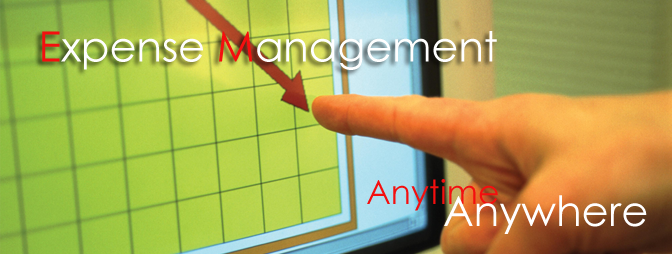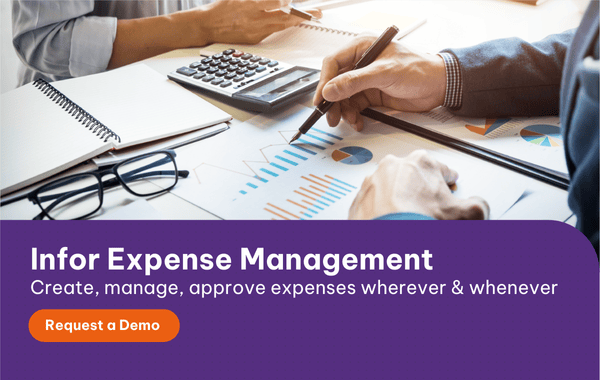As you are well aware, expense management is an integral part of many businesses. This normally involves employee travel and entertainment expenses. Yet Aberdeen Report found that 53 per cent of businesses are still managing their travel expenses manually; gone should be days of manually reporting expenses. It is both a demanding and potentially risky process. All this time wasted, used energy and risk of resources can be regained with the use of cloud-based expense management systems.

What is a cloud-based expense management system?
A cloud-based expense management system works by allowing employees to upload receipts into an online database as opposed to saving the physical copies. This is then transformed into a digital expense report and presented to the company’s accountants.
Because the system is cloud-based, every receipt image and piece of information put into the management system by the company can be securely backed up and accessed from anywhere.
In an era where markets encourage the mentality to ‘digitalise everything’, cloud-based expense management solutions are already used in large multinational corporations. It allows entire offices to migrate yet another process from paper and pen to the internet. A return on investment from a cloud-based expense system comes quickly, as is the case when discussing the benefits of this system.
Read more: How Raymond James Financial Slashed 50% of Its Reporting Time
Cost saving
An important consideration for any company when investing is how much money it will save. All other benefits are overshadowed if a cloud-based expense management solution cannot create significant cost savings for the business.
The cost factor remains one of the key reasons why companies change to cloud-based services. The automation saves you not only the costs of processing the reports and accurately calculating the expenses but also the cost of establishing a sense of compliance in a company.
Business Finance reports that cost control is a major reason for choosing the cloud. Using automated, cloud-based expense management software is a great way to improve efficiency, resulting in a solid financial benefit.
In 2015, Paystream Advisers reported that the average cost for manually processing an expense report was $26.60 USD. That number drops to $6.85 in a fully automated system like the cloud. An Aberdeen report found that the average company spends 10 per cent or more of its annual budget on travel-related expenses. For example, businesses that make use of online expense management often save up to $2,000 in annual postage costs.
The reason is that the cloud-based expense management alters your data backup plans, and makes it easier to file reports. Your employees will become more efficient since they don't have to manually log every cost. Since it handles most processing automatically, no-one has to spend extra time fact-checking and processing expense reports.
Read more: Why keeping a tight control of SG&A expenses may backfire
Collaborative advantage
According to Business finance streamlined, a cloud-based platform often fosters a better environment for collaborative work. If you’re ever in a position where the expense you need information on is in another base, or you don’t think integrating new systems is working, the cloud provides the optimal solution.
Cloud expense management solution enables the teams to collaborate effortlessly across multiple locations. The accessibility factor helps the team access project reports from central storage and leverage it within a secured network. The cloud-based systems are highly flexible and collaborate with other business applications seamlessly without impacting the other operations.
Delivers smart analytics and transparency
It helps the business in identifying process gaps backed by data and enables them to take essential steps to eliminate unnecessary and inaccurate costs. Using a cloud-based expense management solution provides organisations with greater visibility into areas where they can improve upon business processes and manage more effectively.
The smart reporting feature empowers HR managers to conduct better negotiations for cost-effective travel and business expenses. They can issue robust rules, and spending guidelines, spot errors or malicious fraud earlier, as well as identify opportunities for preferred vendor relationships.
Employee satisfaction
No matter the size of our company, we care about the approval of employees. Cloud expense management improves on the everyday process for employees. A cloud-based automated system makes it much easier for employees to submit expense reports.
Instead of keeping track of paper receipts, they can take a picture of the receipt with their smartphone and upload it directly to the expense report system. They can also forward email receipts with ease, and because this user-friendly system processes expense reports quickly, employees are able to get reimbursements in a timelier manner.
Bill Hayes, CEO of Vendormate, a company that has found success due to automated expense management solutions states “Anything that gives more time back to employees is not only cost-effective but it’s creating value for the company."
Employees benefit from faster reimbursements, immediate data entry, never needing to save receipts and error-free reporting as violations are flagged before a report is even published. By offering a system that creates expense reports without the need of any manual entry, you can repurpose employees wasted time to other valuable projects and as a result, the satisfaction of employees has a domino effect on the company’s overall performance.
These are the major benefits of switching to a cloud-based expense automation system, the case built to encourage companies to get rid of manual operations. Just because what you have works, doesn’t mean that it can’t (and shouldn’t) be improved by new solutions brought about by innovation.
Arming your employees with cloud expense management solutions is an absolute necessity, but you’ll only reap the benefits if you work with a provider who can offer you the best. The question isn’t who could benefit from the use of cloud-based expense management solutions, the question is, who couldn’t?
 English
English  Vietnamese
Vietnamese 

